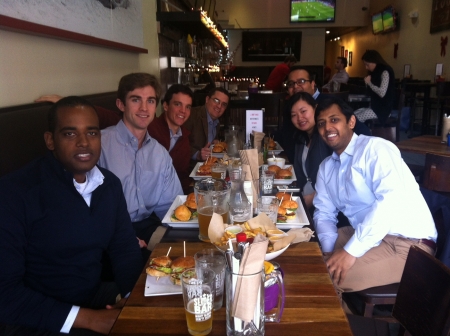
By Avi Sethi T’16 and Mat Sevin T'16
Avi is a first-year student at Tuck who previously worked for the NewSchools Venture Fund, a Palo Alto based ed-tech seed investor. Previous to NewSchools, he worked in strategy consulting at Accenture based out of New York City. He started his career as a high school math teacher in Charlotte, NC through the Teach For America program. Avi is a proud Minnesota Golden Gopher alum.
Mat is also a first-year student at Tuck. He worked for three years as a web analyst for Major League Baseball Advanced Media, focusing on social media and advertising sales strategy. He started his own company in college which made conductive gloves (gloves that can type on touchscreen devices). Mat attended the ILR school at Cornell, where he studied economics, business, and film. He grew up in Manhattan, New York. He is a sports and film junkie.
The summer before I arrived at Tuck, I left my job as a strategy consultant in order to try my hand at venture capital. Having been a high school math teacher through the Teach For America program, I found an opportunity at the NewSchools Venture Fund in Palo Alto, Calif., which was investing in early stage ed-tech startups. Atfer receiving a taste for what the venture capital space was like—and absolutely loving it—I decided to further explore it once I arrived in Hanover.
Even early into the fall term, it was clear that despite venture capital being such a small industry, Tuck (and the broader Dartmouth community) punched above its weight. Among the many visitors we had on campus were John Taylor T’79, head of research for the National Venture Capital Association, the Washington D.C. trade organization that represents the venture capital industry, and Peter Barris T’77, managing partner of New Enterprise Associates, the largest venture fund in the world. I was fortunate enough to have shared a meal with both of them, which is one of the fantastic things about being at a smaller school.
Inspired by their words, I reached out to see if others were interested in further exploring the VC space with me. While nearly 50 students responded with interest, four other first-years—Robby Greer, Elizabeth Jin, Alex Kremer, and Mat Sevin—offered to work with me in developing some sort of a trek. With venture capital being such a tough industry to break into, and with the economy having only now started to recover more noticeably, over the past five years there hadn’t been the sort of formalized trek we were hoping to put together.
We started by compiling a list of nearly 100 VC firm names in the hopes of landing at least five to six meetings. As it turns out, we barely needed 15 names; the alumni we reached out to were super responsive and excited to host us—further evidence of the great Tuck alumni network we had heard so much about.
Our team, advised by Tuck’s Career Development Office as well as Tom Naughton D’89, T’96, executive director of the Center For Private Equity and Entrepreneurship and a former venture capitalist, designed the trek so that we could see the venture space from different angles—meeting with mega funds, seed funds, impact investors, and everything in between. By spending a few hours each month strategizing, planning, and marketing the idea, our team developed a trek that would have us meeting with 10 different funds over the course of three days in Silicon Valley. All told, a dozen Tuckies would join us as we visited the following VCs: The NewSchools Venture Fund, Accel Partners, New Enterprise Associates, Pinnacle Ventures, Crosslink Capital, Canaan Partners, Norwest Venture Partners, Felicis Ventures, Imprint Capital, and DBL Investors. Together these funds were responsible for investments in a who’s who of Silicon Valley’s best startups—Dropbox, Facebook, Fitbit, Kayak, Khan Academy, Revolution Foods, Solar City, SpaceX, Spotify, Tesla, and many, many more.

Another great feature of the trek was its timing. We decided to host our trek at the same time as Tuck’s annual technology trek, one of the school’s most popular career-based events, with approximately 75-100 students flying from Hanover to San Francisco at the conclusion of fall finals. This year’s tech trek included visits to Google, Facebook, IDEO, Tesla, EA, Intel, Square, and many more. Students on this trek also spent a day in Seattle visiting the headquarters of Microsoft, Amazon, and other Seattle-based tech firms. By holding our trip at the same time as the tech trek, we were able to pick and choose different meetings to attend and maximize our time in the Bay Area. I attended an early-morning meeting at IDEO, had lunch at Google, met the new CMO of Facebook, and attended a happy hour at The Parthenon Group’s office overlooking the Bay as the sun set in the background.
Fast forward to the final day of our trek, where we found ourselves overlooking the beautiful rich-green trees in Palo Alto from the office of Norwest Venture Partners. Up to that point, we had zigzagged between Menlo Park, Palo Alto, and San Francisco for three days. No two firms were alike. Each has its own unique ethos, culture, and investing thesis—the common bond being the incubating of the tech community (and yes looking for a positive ROI). Each fund gave us different advice and perspectives. Some talked about a day in the life of an associate. Others walked us through their investment logic behind specific deals. A few gave us a macro view of the venture capital industry and where it was going. If the trip had ended there, we all would have been more than content.
That is when Jeff Crowe D’78, walked in.
Jeff, the managing partner at Norwest, started out by mentioning how happy he was to meet with us. He had flown back from New York City the night before, narrowly escaping inclement weather. Jeff, who also happens to annually make the Forbes Midas Touch List of top venture investors in the world, mentioned how he had just returned from visiting the New York Stock Exchange. An entrepreneur he invested in some years ago was now ringing the bell on the IPO of his company, Lending Club!
Having totally captured his audience—I mean seriously, could there have been a cooler introduction?—Jeff started to tell us parts of his life story. He too had come to the West Coast from Hanover. After initially finding success on the operations side of a technology company, Jeff moved into entrepreneurship and later into investing. While Jeff did reaffirm that that there was no one way into VC (and that it was still very hard to break into), it was clear from his path that if you made a career in tech and kept your ear to the ground, opportunities would arise. Jeff also laid out clear principles for establishing a truly sustainable career. He laid out realistic timelines and told us how to best leverage the Tuck-Dartmouth network and our unique skillsets.
At this point, a lot of the great advice we had received throughout the trip became contextualized. The main point was that when you treat technology as both the launch pad and destination for your career, opportunities in your area of interest—whether startups, venture capital, or large tech firms—will arise. From there, it’s up to you to make the most of them.
For those of us who attended the trek, the message was clear: Keep doing what you are doing. The gumption that got this trek off the ground is the same sort of resourcefulness we will need as we work to break in and ultimately succeed in this space. As the trek concluded, we all agreed this had been a wonderful learning opportunity and we were already thinking of ways to make the trip even better next year.